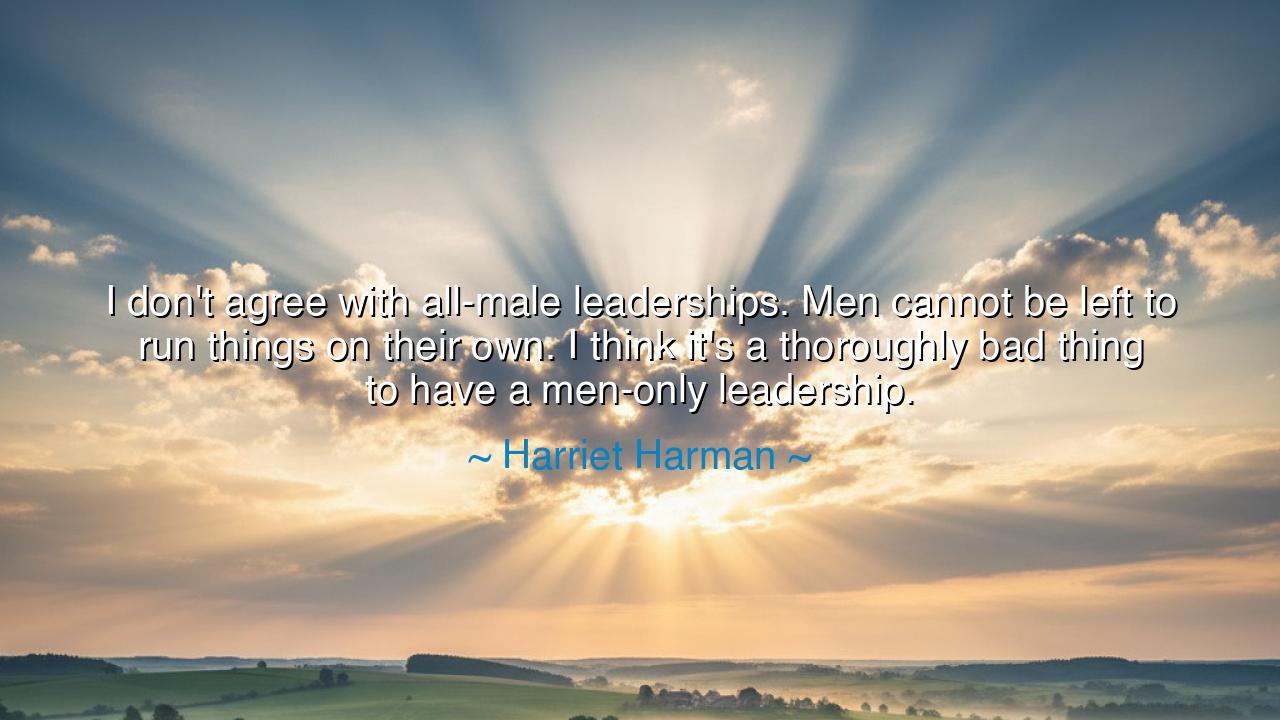
I don't agree with all-male leaderships. Men cannot be left to
I don't agree with all-male leaderships. Men cannot be left to run things on their own. I think it's a thoroughly bad thing to have a men-only leadership.






“I don't agree with all-male leaderships. Men cannot be left to run things on their own. I think it's a thoroughly bad thing to have a men-only leadership.” Thus spoke Harriet Harman, one of the enduring voices of equality in modern Britain — a woman who, through the long and stormy corridors of Parliament, has fought for the balance of power between the genders. Her words are not born of bitterness, but of wisdom, of the recognition that leadership, when confined to one half of humanity, becomes not strength but distortion. For the governance of people, like the harmony of nature, requires balance — the mingling of perspectives, the union of compassion and courage, of insight and resolve.
In this declaration, Harman does not condemn men; she condemns exclusion. She speaks against the old order, where decisions of nations and fates of millions were made by men alone — where women were expected to bear the consequences of choices they never had a voice in. Her words rise as both a rebuke and a reminder: that no leadership is whole without the wisdom of women, and that societies which silence half their citizens do not merely oppress — they impoverish themselves. True power, she teaches, is not the dominance of one, but the partnership of all.
The ancients understood, even if they did not always practice, this truth. In the myths of Greece, even the mightiest of gods sought counsel from the goddesses. Athena, born of wisdom, stood beside Zeus not as a servant, but as an equal in thought and counsel. And when she was ignored, chaos often followed. So it is in the world of men — when governance becomes the echo of a single voice, when the masculine spirit acts without the tempering grace of the feminine, imbalance breeds folly. Harriet Harman’s words are a call to restore that ancient equilibrium, not only in parliaments, but in every place where power dwells.
History itself bears witness to the peril of men-only leadership. Consider the long centuries of war, conquest, and greed — the empires built on pride and ambition, yet too often blind to mercy. How many wars might have been averted, how many injustices softened, had women been present in the councils of kings? When Golda Meir led Israel, she brought not weakness, but resolve tempered by humanity. When Eleanor Roosevelt walked among the world’s leaders, she spoke of human rights with a vision that saw beyond nation or creed. Their strength was not the imitation of men, but the expression of balance — of justice guided by empathy, of firmness joined with care.
Harman’s words, then, are not merely political; they are philosophical. They point to the deeper principle that the world thrives in harmony, not hierarchy. The leadership of men alone, like a bird with one wing, cannot rise to its full height. Humanity advances only when both halves of its soul — the masculine and the feminine — act together in mutual respect. When women lead alongside men, societies gain the wisdom of wholeness: reason joined with intuition, courage softened by compassion, and authority illuminated by understanding.
But this wisdom must not remain a dream; it must become action. It is not enough to speak of equality — one must build it. Harman’s challenge calls upon every generation to open the doors of leadership to women, not as tokens, but as true partners. In governments, in companies, in communities, and in homes, let leadership be shared, that decisions may be richer, wiser, more humane. Let young girls see in the mirror not the reflection of limitation, but the promise of participation. Let men, too, embrace this partnership not as loss, but as liberation — for when power is shared, it becomes not weaker, but purer.
So, my listener, take this truth as your inheritance: that leadership without women is leadership without balance, and that balance is the root of wisdom. A nation ruled by one voice will stumble; a nation ruled by many in harmony will endure. Stand, then, for this balance wherever you dwell. In your work, in your home, in your world — give space to the other half of humanity’s genius. For when both man and woman lead together, the world moves not in conflict, but in concert — and in that harmony lies the promise of a brighter, nobler age.
Thus, as Harriet Harman declared, so may we affirm in our own time: “It is a thoroughly bad thing to have men-only leadership.” For the light of progress shines brightest when reflected from two flames — the strength of men and the wisdom of women, burning side by side.






AAdministratorAdministrator
Welcome, honored guests. Please leave a comment, we will respond soon